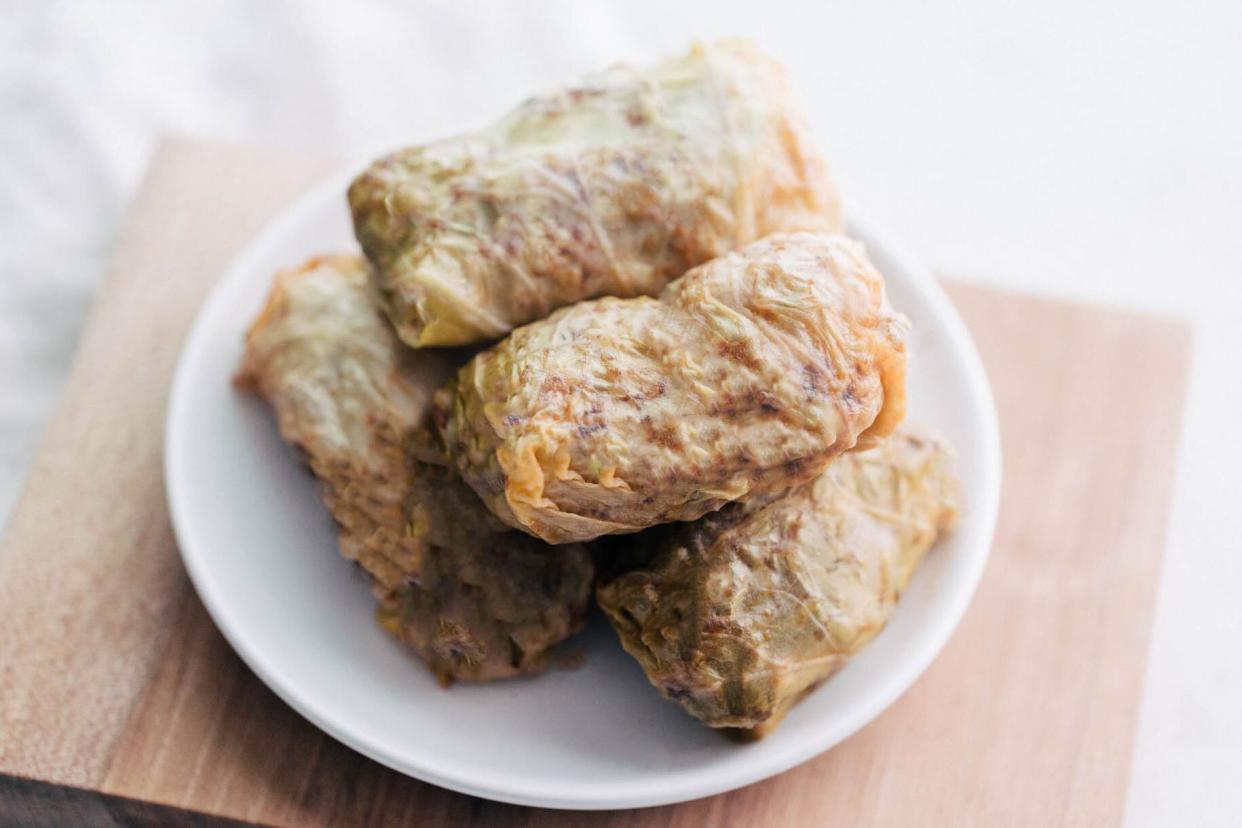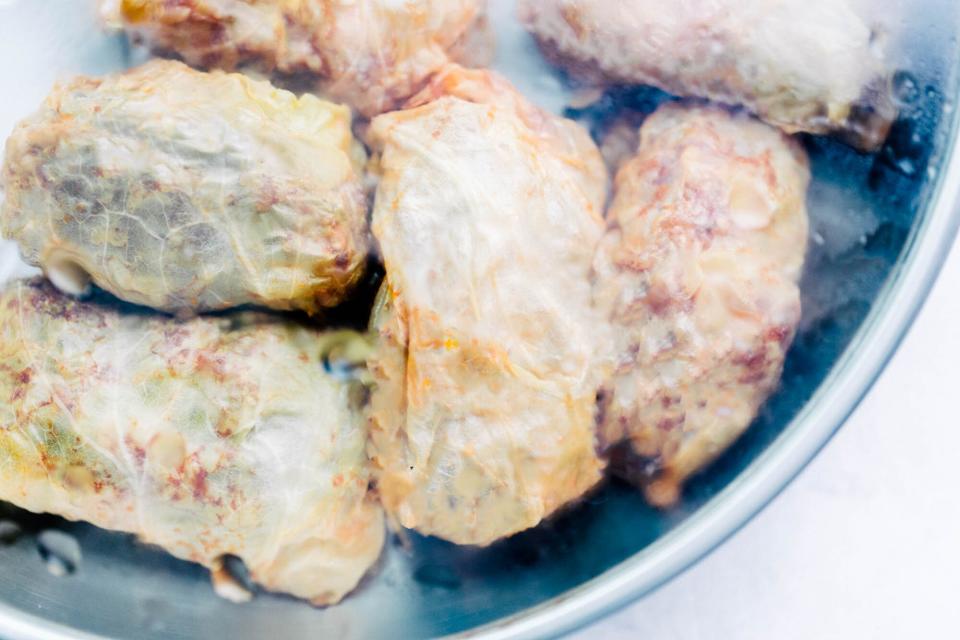This Family's Beloved Cabbage Rolls Capture A Lifetime Of Memories And Community

Emily Laurae
It's hard to tell when a story starts, when it feels like it's been there all along. That's how food is in the South. The smallest touches on a dish make it unique, and the stories about how a certain food came to be are part of the tradition.
But Southern food is so much more—Southern food shows resilience and community, alongside a twisting history spanning generations and continents. Southern food is a mix of different cultures and experiences, bound together by circumstance and generosity.
Think about it: Without our neighbors, we wouldn't have some of the foods we call our favorites.
Recipes change over time, enhanced and adapted to fit new audiences. Tastes and flavors also change over time, but some things stay the same. Like the comfort and warmth felt by a dish that means a lot to you.
Maw's Cabbage Rolls
As a kid, my family would make trips to my maternal grandparents' house in South Carolina. We would sit on their porch during the summers, catch fireflies in jars, climb trees, and tend the garden, while Pop sat in "his chair" writing down recipes and Maw did the Sunday crossword with her magnifying glass at the kitchen table. Dinner was served around sunset, and was always followed by a little something sweet, created and tested to perfection by Pop himself.
Out of all of the family dinners we shared together, nothing stood out like cabbage rolls.
After years of cooking for her and her family (aka Pop, my mom, my two aunts, and my uncle), Maw crafted what I argue to be the best dish of all time: cabbage rolls. Her recipe doesn't contain special ingredients or have difficult techniques. It doesn't require hours of preparation and lots of cleaning afterwards. It's just leaves of cabbage, meat and rice inside, steamed until tender. But Maw's cabbage rolls were one of the first foods I remember eating where there was dead silence in the kitchen, and there were no leftovers at all.
When I was growing up, my mother would make cabbage rolls for our family dinners. It was one of my dad's favorites, and he said he particularly liked the lemon taste absorbed by the cabbage leaves. He called them "gołąbkis," which I always thought was a fun word to say.
My mom's favorites were the darker leaves, which had a bit more "bite" to them. I was neutral to both of them, but liked the separated cabbage bits the best—where the leaves that had lost their filling but still got cooked and steamed with everything else. After a few years, cabbage rolls were unanimously voted as our special dinner.
One of my favorite Southern traditions is the unspoken, but very understood, concept of the "special dinner." Whether it's lasagna for Christmas or coconut cake for birthdays, the "special dinner" is unique to every family and every person. For my family, it was unanimously cabbage rolls.
Get the Recipe: Maw's Cabbage Rolls
It wasn't until I was an adult that I started asking myself: Where did cabbage rolls come from? How did something so simple and ordinary become so important to me and my family?

Emily Laurae
A Family Recipe, A World of Influence
My grandparents met in Anmoore, W.V., where they got married and had a daughter, my Aunt Kathy. Pop wanted to be a teacher, and for that to happen, the entire family would have to move to Illinois. My grandma, being the sole caretaker for the family (and the "I'll make this happen or die trying" type of personality), made it happen.
While living in Champaign, my grandparents were introduced to cabbage rolls by another couple teaching at the university. They were Egyptian, and their cabbage rolls laid the basis for what would become Maw's cabbage rolls today.
But as it turns out, there was another cabbage rolls story for my family.
My father's side of the family immigrated from Poland, and bits of the traditions seeped into my childhood life, sometimes without even knowing it. It wasn't until I started learning to speak Polish that I realized the biggest irony of all: Gołąbki is Polish for stuffed cabbage, and my Dad had been served this dish by his family, too.
We think of food as a communal experience. Gathering to prepare a meal, and sitting down to eat it, rinsing dishes, and sharing stories afterwards. Just as some families have their specific ways of making pizzas or pasta, my family had cabbage rolls.
When my mom taught me how to make cabbage rolls, I complained about how the steamed cabbage burned my fingers. The whole head of cabbage gets par-boiled, slowly, and slowly stripped of its leaves, one at a time until empty. I complained about how cutting out the vein of each cabbage leaf was impossible, because the cabbage leaves kept on coming and coming. Then, I complained about how fast we had to stuff and roll them before the cabbage lost its bend from the heat. There wasn't enough salt, there was too much pepper. Did we really need all that lemon juice? Mom just smiled.
"Imagine Maw doing this by herself for years and years. Making tray after tray of cabbage rolls, then steaming them batch after batch for hours in a hot kitchen, only for them to be gone faster than they came."
There were never any leftovers.
Food is also a cultural experience. Every culture places a different importance on food, and every recipe has nuance based on where it came from or who is making it.
My Dad's cabbage rolls were thicker, with diced onions and covered in tomato sauce. The Egyptian couple's cabbage rolls were cooked and steamed in lemon juice, cumin, and other spices.
Southern food gets its magic from the people that inspired it. For many people, that includes the communities that shared their stories and their magic with us. The world makes us adapt to the things around us, but we all still find ways to pay a little homage to things that are special to us.
Sometimes that's naming a mac and cheese recipe after your friend or loved one that brought it to the cookout, or sometimes that's adding lemon juice to your cabbage rolls in honor of a dear friend and colleague. My grandparents couldn't afford a lot, but their cabbage rolls were able to memorialize a point in their shared history, making it a testimony not only to their own lives, but for mine and my siblings.
This is only a small glimpse into the world created by food. My story is one of many. Although my experience is unique to me and my family, the feeling is universal: We all have made an impact on one another, and that part will stick with us for generations to come.

